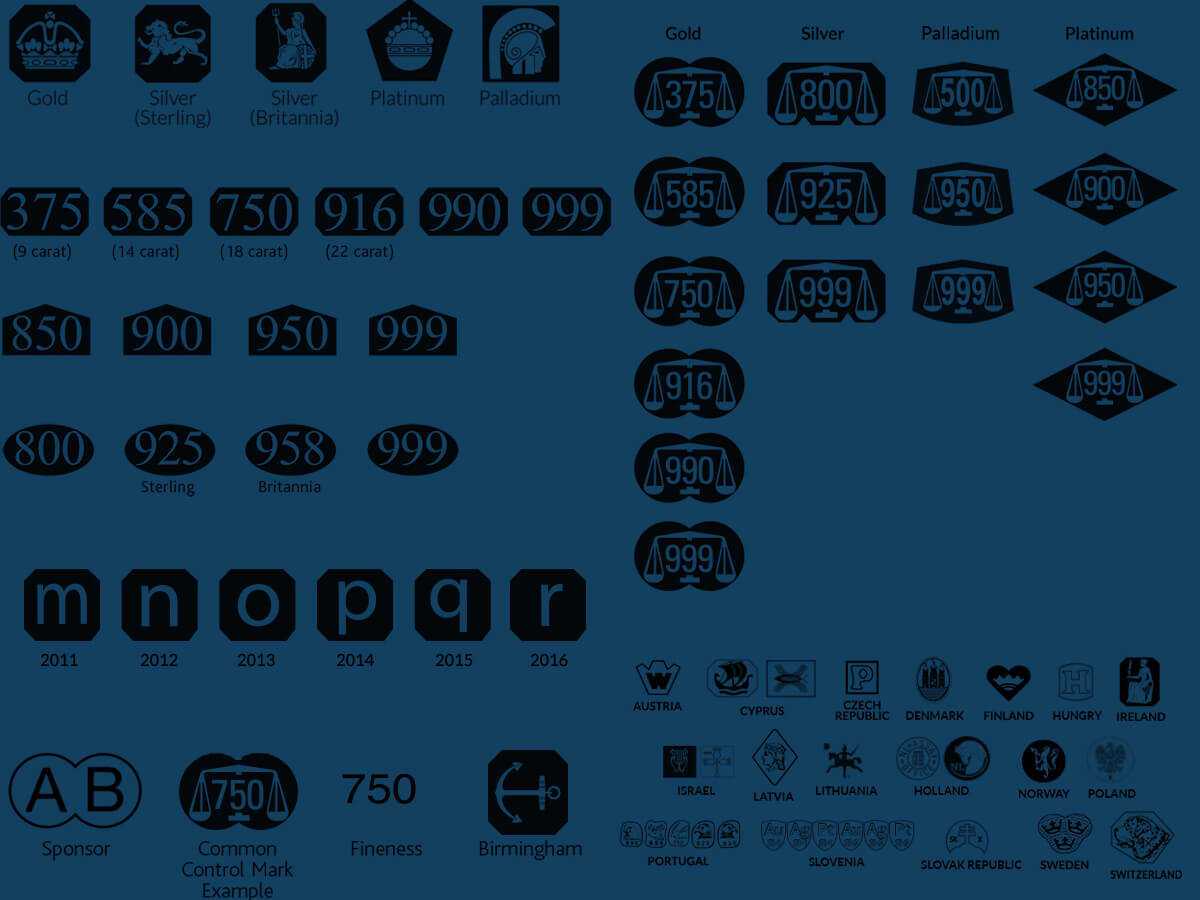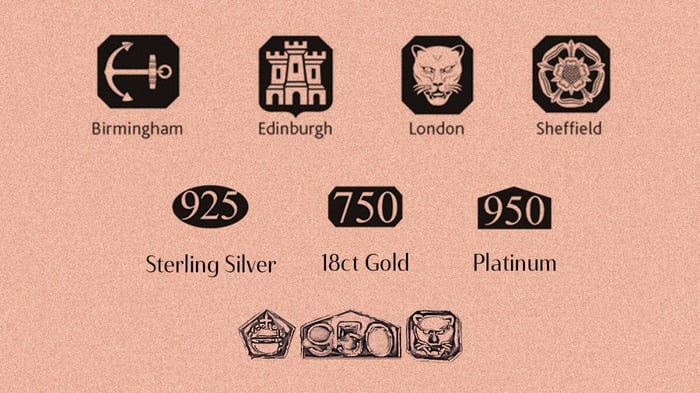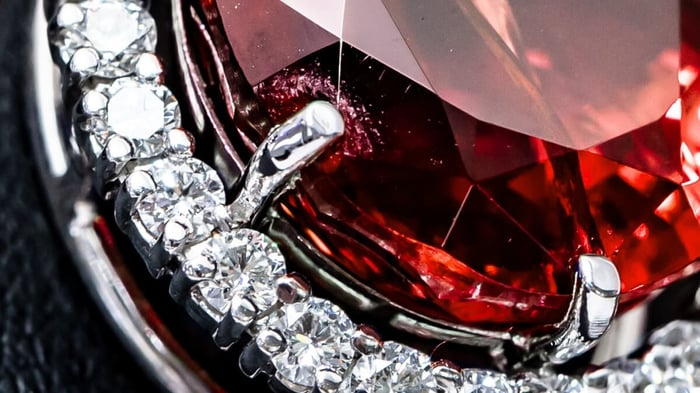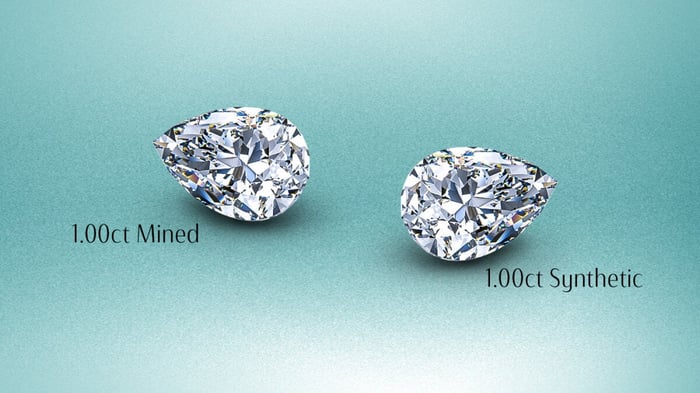Hallmarking And Your Jewellery: What You Need To Know
Hallmarks are small stamps or laser engravings on gold, silver, palladium, and platinum, jewellery. Hallmarks provide the buyer with certainty that the metal they are buying is as pure and 'precious' as the seller told them it was. Hallmarking is a centuries-old practice and is perhaps the first consumer protection legislation.
Here are ten things that you need to know about the hallmarks on your jewellery.
1) Any item of gold weighing more than 1g must be hallmarked. Silver items weighing over 7.78g must be hallmarked, and for platinum, the lower limit is just 0.5g. Palladium weighing less than 1g also needs no hallmark. Without a hallmark, any items heavier than the lower limits cannot legally be sold in the UK.
2) A UK hallmark tells the buyer who submitted the item for hallmarking, the purity of the metal used. Jewellery is rarely made with pure metal. Precious metals are mixed with other metals to make soft metals more durable and to alter the colour to, for example, give us white or rose gold. The final compulsory mark tells where the item was tested (assayed) and hallmarked. In the UK there are currently four assay offices: London, Birmingham, Sheffield, and Edinburgh.
3) It is an offence in the UK to sell or offer, in the course of trade or business, a non-hallmarked item made of gold or other precious metals.
There are a few exceptions:
Items that weigh less than the legal limit, gold thread, items not for jewellery, and coins.
Vintage items made before 1950 do not need a hallmark to be sold.
0.35ct Emerald 0.20ct Diamond Seven Stone Ring 18k Yellow Gold

£687.00
£987.00
A delightfully handcrafted yellow gold curve sweeps around to a perfect seven stone setting of diamonds and emeralds. A modern and playful arrangement of beautiful G/SI quality diamonds. A fun adornment to the hand of your loved one that will… read more
4) The first hallmarking program was set up in England in 1300 by King Edward I because dishonest goldsmiths were tricking people into buying underweight, impure or fake gold and silver.
5) Platinum was not required to be hallmarked, in the UK, until 1975. Older items typically carried a mark saying 'Platinum' or 'Plat' with no indication of purity.
6) Gold plated silver should carry a silver hallmark. This means you may see gold plated jewellery described as 925 and 9ct gold plated where the 925 refers to the purity of the silver. The 925 indicates the silver is 92.5% pure silver and the gold plating in 9ct gold.

7) Not all jewellery made with precious metals sold in the UK carries a UK hallmark. Britain is a member of the International Convention on Hallmarking, which means that it is legal to sell, in the UK, jewellery hallmarked in any country that is also a member. Also, at least until Brexit is finalised, EU member country hallmarks are legal here.
8) All Diamond only sells jewellery carrying a legitimate UK hallmark. A UK hallmark is the ultimate guarantee of quality because it is extremely easy to check UK hallmarks to discover the quality of the precious metals used.
9) Until very recently, all precious metal hallmarks were stamped, by hand, into the metal. This is a problem for small, delicate items that might be damaged by the force used to press the hallmark into the metal. Laser engraving is now offered by the Birmingham assay office, meaning that delicate items can now be hallmarked without risk of damage.
10) A UK hallmark does not mean that the item was manufactured in the UK. Very often, precious metal jewellery is made overseas and imported. The required hallmarking is then carried out in the UK. Hallmarking is a guarantee of quality, not of the country of manufacture!
Bonus Hallmarking Tip!
As a requirement of the British Hallmarking Act 1973, all dealers that supply precious metal jewellery must display a notice explaining the approved hallmarks. This means that you can check the hallmarks on any precious metal jewellery in the shop.
The required notice is only for UK hallmarks. It is not possible, or a legal requirement, to display foreign hallmarking information.
If a retailer does not display the legally required notice, you should probably choose to make your purchase elsewhere!

Now that you know some important but not widely known information about hallmarking. You can protect yourself against fraud and be sure that you are getting what you pay for!
You can find out more about hallmarks and other jewellery information in the All Diamond information pages.




